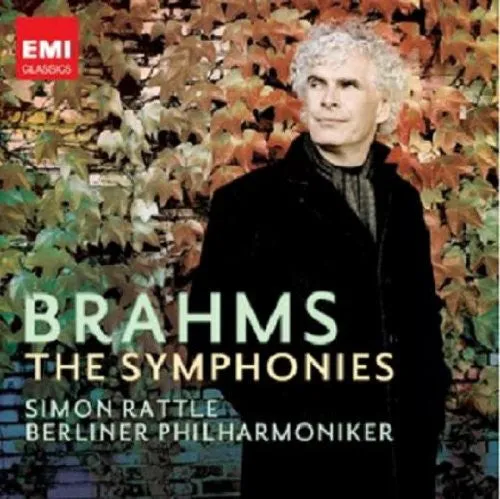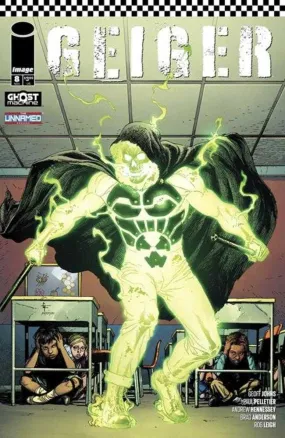The name of Simon Rattle had not been closely associated with the works of Johannes Brahms so it was even more rewarding when his first Brahms recording with the Berliner Philharmoniker, Ein deutsches Requiem, won critical accolades and both Grammy and Classic FM/ Gramophone awards. Now Sir Simon and the Orchestra have committed to disc the complete Brahms symphonies, recorded in concert at Berlin’s Philharmonie in the autumn of 2008. In the words of Die Zeit, “Simon Rattle has finally dared to tackle Brahms with the Berliner Philharmoniker. He combines Furtwängler’s monumentality with Karajan’s beautiful sound.”
The Brahms symphonies concerts drew praise from the German critics: “The fourth symphony was an ecstatic apotheosis of what current orchestral playing, quick reactions and scarcely sketched annotations can get out of this work which has long since become a classic. Especially the Passacaglia finale was a finely-dosed wonder of sound refinement and harmonic finesse. Rattle appears to have finally conquered his difficult Berliners.” (Die Welt)
Stephen Johns, Vice President of A&R, EMI Classics, commented, “We are extremely pleased to be able to present Sir Simon Rattle and the Berliner Philharmoniker in this major new recording of the complete Brahms Symphonies - music that lies at the very core of the orchestra's repertoire and reputation. With the combination of Sir Simon's vision and iconoclastic approach, and the orchestra's remarkable technique and unique sound, these new performances should prove a new milestone in the history of recordings of these works, and a valuable addition to the growing catalogue of Sir Simon and the Berlin Philharmonic.”
Discussing the Brahms symphonies performances and recordings Sir Simon agreed that Brahms is very much at the centre of the Berliner Philharmoniker’s sound and style of playing. “Of course, the works were newly minted when the Orchestra was [being born] – in the first three years of the Orchestra’s history, they played all of them.” He also described the particular sound of Brahms, “steeped in the German ethos, the idea of the forests and the sound of horns coming from a distance, even the forest colours” and confirmed that performing these works with the Berliner Philharmoniker, which has been hailed as the world’s greatest Brahmsian orchestra “gives you a possibility of colours that you have almost nowhere else. … I can say to this orchestra, ‘I need a different sound’ and the sound changes immediately.” Brahms loved musicians with individual ways of phrasing, even when these were apparently contradictory – he loved the playing of the violinist Joseph Joachim, for example, who used almost no vibrato and that of the clarinettist Richard Mühlfeld, who played with much more vibrato than any clarinettist before or since – “There was no one way of performing.” Bearing this in mind, Sir Simon and the Orchestra have approached the symphonies anew, trying things they had never done before. At the end of the first movement of the Second Symphony, for example, Sir Simon asked the Orchestra’s principal horn, Stefan Dohr, about the possibility of trying a stingendo at the end of the big horn solo. “And Stefan not only took it and ran with it, but actually wanted to do much more than I had originally intended. He did it and it makes a moment of crisis rather than a moment of peace. And that’s wonderful.”
In his review of the Berliner Philharmoniker/Simon Rattle’s performance of Brahms’s Symphony No. 3 at the BBC Proms in September 2008, Andrew Clark of the Financial Times commented that Simon Rattle had spent most of the past six years attempting to drag the Berliner Philharmoniker into the 21st century, making the Orchestra “more versatile … more aware of its function in the community, more alert to a younger generation. But in this most dynamic of conductor-orchestra partnerships, the partner who has changed most is Rattle” as he has grown to value the Orchestra’s fabulous musicianship and tradition even more than before. “The evidence was there in Brahms’s Third Symphony, the most beautiful performance of this work I have heard, radiating a profundity that was not lost on a rapt Proms audience.”
Simon Rattle’s association with EMI dates back to the 1970s and has resulted in many award-winning and ground-breaking releases. Previous critically acclaimed recordings with the Berliner Philharmonker encompass works by Bruckner, Brahms, Holst, Shostakovich, Prokofiev, Schoenberg, Richard Strauss, Schubert, Mahler and Debussy. Their release of Holst’s The Planets won ‘Classical Recording of the Year’ at the Classical Brit Awards. Their Berlioz Symphonie fantastique/La mort de Cléopatre disc won an Excellentia award from Pizzicato, the Luxemburg-based European classical music magazine and, most recently, their recording of Stravinsky’s Symphony of Psalms won a Grammy award in the ‘Best Choral Performance’ category.
“[The September 2008] Proms performance [of Symphony No. 3] was manifestly Brahmsian in its warmth, lyrical flow and structural coherence. It was manifestly from Berlin in its richness of timbre and soloistic allure … But it was also manifestly Rattle in its flexibility of tempo and adherence to the score.” (Financial Times)















